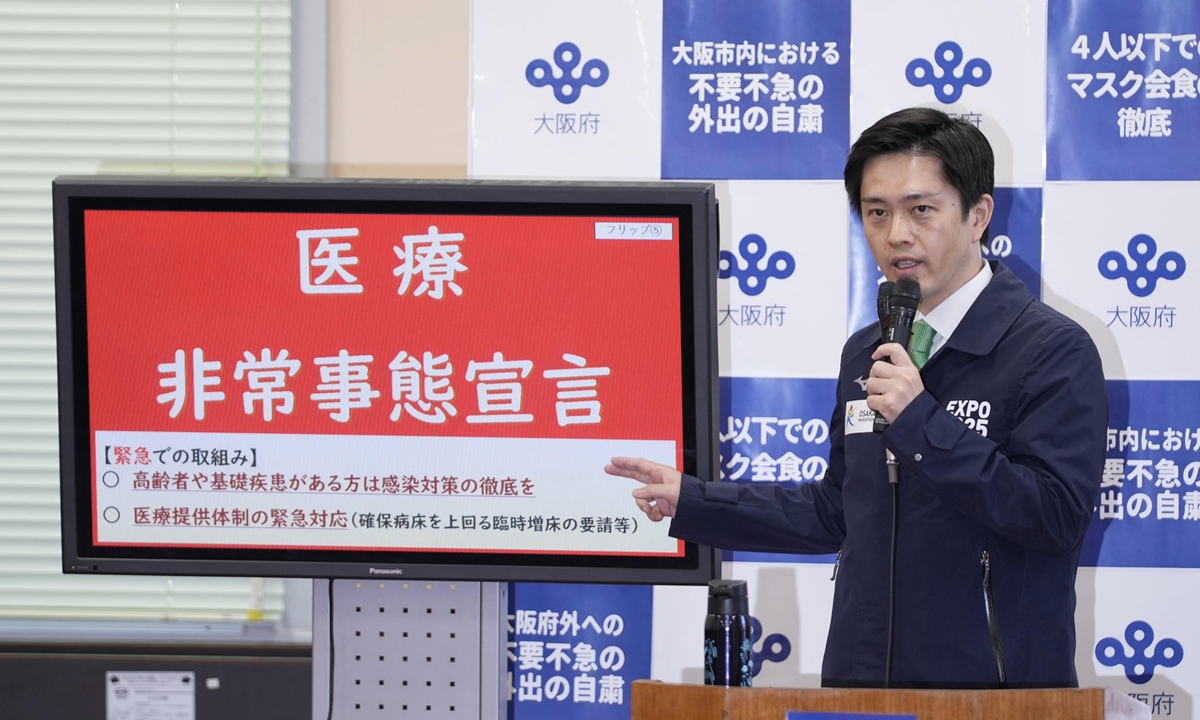
Osaka governor Hirofumi Yoshimura says on April 7 that the street torch runs for the Tokyo Olympic Games would be cancelled. Osaka has decided to declare a medical state of emergency due to the increased strain on its health care system amid surging coronavirus infections. Photo: VCG
With the Tokyo Olympic Games weeks away, Japan faces a double whammy over the escalating epidemic and mounting challenges to hold the sports event especially after the US warned Americans not to travel to the country.
Chinese observers believed that Washington's "Level 4: Do Not Travel" advisory, which is the highest cautionary level in the US State Department's hierarchy of warnings, is a bellwether in the international community and more countries could follow suit to issue travel alerts or other restrictions to their citizens to visit Japan.
If the outbreak continues to worsen in the country, the sports event is likely to lose all of its in-person spectators and even many participants and other relevant personnel of the games from the world, and some events could be cancelled, which would result in an immense economic loss to Japan, observers warned.
The Tokyo Olympics Games, postponed in 2020 during the early days of the COVID-19 pandemic, are facing increasing hurdles in putting on a 2021 show. The latest troubling sign for the event came Monday when the US State Department advised US citizens against traveling to Japan, given the rising infections in the country, CNN reported on Tuesday.
The Japanese government and Tokyo 2020 organizers clarified on Tuesday that the US' travel warning will not affect the games.
After the travel warning, Zhao Lijian, spokesperson of the Chinese Foreign Ministry, reiterated on Tuesday that China continues to advise its citizens against unnecessary cross-border travel.
Japan reported 2,743 new cases and 86 deaths on Monday, lifting the total number of confirmed cases and deaths in the country to 722,668 and 12,351 deaths, respectively, according to the latest data from the Johns Hopkins University.
The Japanese government decided Friday to add the southern prefecture of Okinawa to its coronavirus state of emergency. The declaration had already covered Tokyo, Osaka and seven other prefectures through May 31.
Despite the escalating epidemic in the country, data from Johns Hopkins suggested that 2,856,059 people, or only 2.26 percent of the Japanese population, were vaccinated. Media reports said it's the slowest rate among the world's larger, rich countries because of a shortage of medical professionals and a lack of syringes.
Da Zhigang, director of the Institute of Northeast Asian Studies at Heilongjiang Provincial Academy of Social Sciences, told the Global Times on Tuesday the US' latest move toward Japan, although with limited effect on its ordinary citizens as Japan's borders are largely shut because of the pandemic, will serve as a "wind vane" for more countries to follow suit, and relevant personnel, including the American athletes, could choose to withdraw from participating.
The US is very likely to have gained more complete and accurate data of the epidemic in Japan, and holds a negative attitude toward the development of the outbreak in the country, so it issued the highest caution to protect its citizens, Da noted.
The warning threatens to increase opposition to holding the sports event, Da said.
Japan Times in January cited Katsuhiro Miyamoto, an honorary professor at Kansai University, as saying that holding the Tokyo Olympics and Paralympics without spectators would result in an economic loss of up to 2.4 trillion yen ($22.1 billion) in Japan.
According to the professor's estimates, holding the Tokyo Games behind closed doors would cause a loss of 381.3 billion yen in spending related directly to the games, or 90 percent of the original projection for the event.
Tokyo 2020 has raised a total of $3.3 billion in sponsorship money from across Japan, but many companies have faced hardship since the pandemic hit the nation, media reported in December.
The postponement of the Tokyo Olympics is having a domino effect, including Japanese sporting goods brand Asics without its flagship store in New York, Nikkei reported in February.
Nikkei said the organizing committee's growing expenses have fallen on the 15 gold sponsors, each of whom had pitched in an extra 1 billion yen to defray postponement costs.
The Japanese public and the government have become confrontational over whether to hold the games as scheduled. Eighty-three percent of voters said the sports event should be postponed or scrapped, while the ratio of those who want the event held this summer has halved, an Asahi Shimbun survey showed.
For China, whether Japan will hold the event as planned is a "double-edged sword," Da said.
He explained that if the Tokyo Olympic Games can be successfully held, the epidemic can be controlled within range, and the negative impact can be minimized, it will have a positive effect and pave the way for China to hold the Winter Olympics 2022, Da said, noting that it can also increase confidence in a global recovery from the pandemic.




